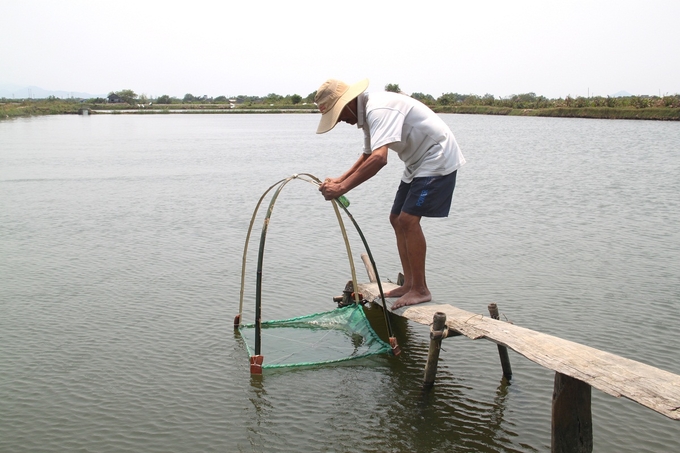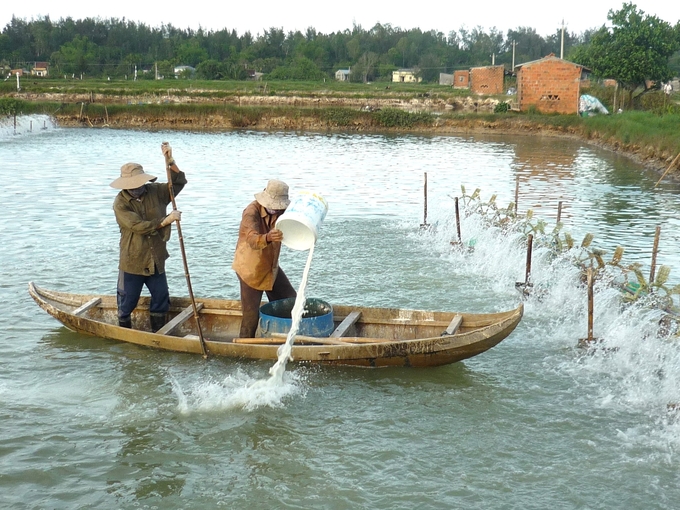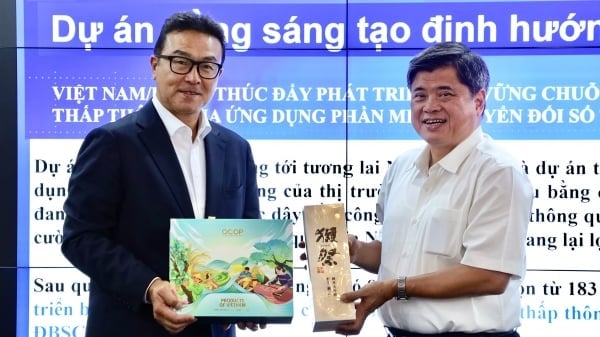May 25, 2025 | 03:16 GMT +7
May 25, 2025 | 03:16 GMT +7
Hotline: 0913.378.918
May 25, 2025 | 03:16 GMT +7
Hotline: 0913.378.918

In recent years, brackish water shrimp farming in Binh Dinh has often suffered from white spot diseases, hepatopancreatic necrosis (early death disease), and harmful environmental diseases. Photo: V.D.T.
Currently, the aquaculture area in Binh Dinh is about 3,484 hectares, concentrated in Hoai Nhon town, Quy Nhon City, Phu My, Phu Cat, and Tuy Phuoc districts. Of which, brackish water aquaculture is about 2,184 hectares, freshwater aquaculture is approximately 1,300 hectares, including extensive fish farming in irrigation reservoirs and fish farming in cages on reservoirs with a volume of over 30,000 m3, aquaculture salt water in sea cages with a total volume of about 57,000m3.
In recent years, brackish water shrimp farming in Binh Dinh has often suffered from white spot diseases, hepatopancreatic necrosis (early death disease), and harmful environmental diseases. Among them, white spot disease and hepatopancreatic necrosis disease are two diseases that cause significant losses to shrimp farmers.
Sick shrimp certainly need veterinary attention. However, the terrestrial veterinary system serving livestock and poultry in Binh Dinh is "inadequate", let alone the specialized aquatic veterinary medicine serving the animals raised underwater, like shrimp and fish.
According to Dr. Phan Trong Ho, Chairman of Binh Dinh Animal Husbandry and Veterinary Association, veterinary medicine and aquatic veterinary medicine are trained differently at the university level. However, those studying veterinary medicine are also trained in ways to treat aquatic diseases, but not as in-depth as those taught in aquatic veterinary medicine. Therefore, when working in practice, those who study veterinary medicine can also work as aquatic veterinarians. Thus, at the commune level, officials in charge of animal husbandry and veterinary medicine are always responsible for disease prevention in marine products, but the effectiveness is not high.
Previously, to fill the grassroots aquatic veterinary medicine gap, the Binh Dinh Department of Livestock and Veterinary Medicine opened training classes for commune-level veterinarians specializing in treating aquatic diseases. However, the results were not as effective as expected.
The reason is that commune veterinary staff are used to treating terrestrial animals such as pigs, buffaloes, cows, ducks, and chickens. Livestock and poultry say they often get sick and need veterinary intervention, so commune veterinary staff also have extra income from injecting drugs to treat animal diseases.
While aquatic animals are sick, the treatment is not "injection", so commune-level veterinarians have no job, which means they cannot earn extra income, so commune-level veterinary officers neglect the aquatic sector.

Shrimp farmers are currently very subjective. When a disease occurs, they do not immediately notify the authorities but instead buy medicine to self-treat. Photo: V.D.T.
Tuy Phuoc district is the largest aquaculture area in Binh Dinh, with 816 hectares, including high tide and low tide areas (area above the dyke and area below the East dyke). With such a large aquaculture area, Tuy Phuoc District Agricultural Service Center currently has 13 people, of which only 3 have veterinary majors.
According to Mr. Tran Van Minh, Deputy Director of Tuy Phuoc District Agricultural Service Center, veterinary officers in localities without aquaculture areas only worry about disease prevention for livestock and poultry on land. , in the operation, there is adequate support from the commune veterinary system. Previously, there was also the village veterinary system.
However, in localities with many aquaculture areas, such as Tuy Phuoc district, district veterinary officers must cover all the work at the grassroots level. The reason was explained by Mr. Tran Van Minh: "Because most commune veterinary officers do not have expertise in aquatic products."
According to Mr. Minh, disease prevention in aquatic products in Tuy Phuoc is even more difficult because shrimp farmers here trust their "several decades in the profession" experience. Hence, they are very subjective when an epidemic occurs.
Mr. Minh shared: When shrimp ponds have shrimp floating on the water surface, swimming listlessly or dying, farmers do not immediately notify the authorities but instead buy medicine for treatment. After 4-5 days, when the problem was not fixed and more shrimp died, the pond owner notified the authorities.
When veterinary staff access the pond, check around to find the cause, and collect samples of sick shrimp for testing, it takes several days to get the test results. That time is enough for the water in the diseased shrimp pond to flow to other surrounding ponds, spreading the disease.
"If the owner of a sick shrimp pond informs the authorities early, the veterinary officer will instruct the gate to close to prevent water from the sick shrimp pond from flowing to other ponds, and then there will be no inter-regional spread of the disease-causing harm to shrimp farmers," said Mr. Tran Van Minh.
"There is only one way to prevent diseases in aquatic animals: to apply biosecurity measures. Suppose aquaculture applies the "3 things" of improving the pond together, stocking the same stock, and adding water together. In that case, it will limit diseases, which means limiting risks for farmers", Mr. Huynh Ngoc Diep, Director of Binh Dinh Department of Livestock and Veterinary Medicine shared.
Translated by Tuan Huy

(VAN) On May 23, Deputy Minister of Agriculture and Environment Tran Thanh Nam held a working session with a Japanese delegation on the application of digital technology in agricultural production.

(VAN) In the tranquil wetlands of Van Long, there are quiet souls who guard the forests, nurture the waters, and oversee every bird and troop of langurs as protecting the essence of a living heritage.

(VAN) WWF, GIZ, IUCN, UNDP call for biodiversity conservation and sustainable development must be regarded as a unity in strategies for a green future.

(VAN) On celebration of International Day for Biological Diversity, Deputy Minister Nguyen Quoc Tri called for practical actions to address nature and biodiversity conservation.

(VAN) Dr. Hoang Thi Thanh Nhan – Deputy Director of the Nature and Biodiversity Conservation Agency – highlighted this on the International Day for Biological Diversity, May 22, 2025.
![Ho Chi Minh city adapts to climate change: [2] Accelerating action](https://t.ex-cdn.com/nongnghiepmoitruong.vn/608w/files/chiqk/2025/05/22/4024-4220-bien-doi-khi-hau-1-100626_766.jpg)
(VAN) Clearly recognizing the challenges posed by climate change, Ho Chi Minh city has swiftly shaped its policies and implemented practical solutions to adapt.

(VAN) Rice straw is no longer just a discarded byproduct, but it is becoming a green resource that helps farmers in the Mekong Delta reduce emissions and promote circular, sustainable agriculture.